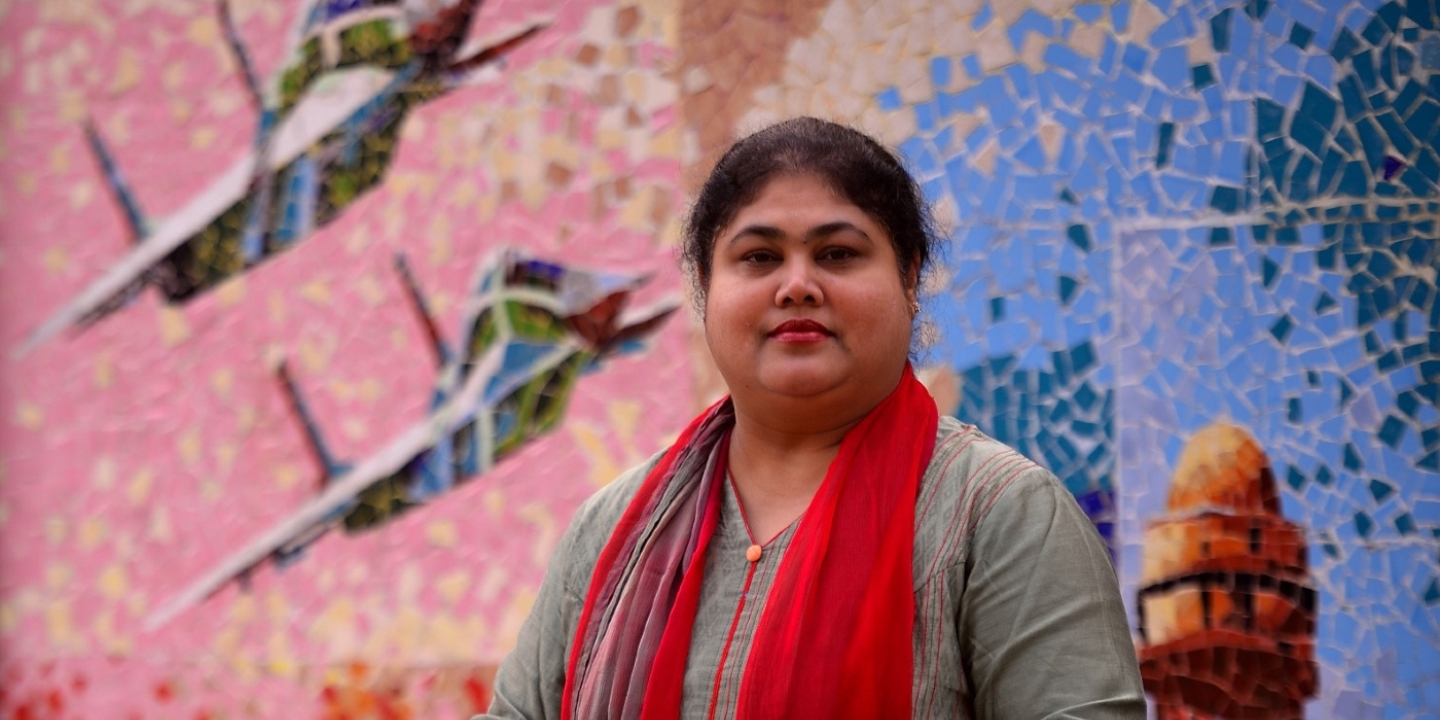
Inspiring alumni continue to lead sustainable development
19 Mar 2024 7 minute readA new longitudinal study is following 6 Australia Awards alumni, to examine the impact of their scholarship on themselves and their home country.
Nahid Sultana Mallik has been busy in the 7 years since she finished her Masters of Arts (research) in Adelaide.
Her LinkedIn profile only hints at the depth of the work she is now doing in senior roles with the government of Bangladesh – listing skills such as policy research, project management and international relations.
It doesn’t reveal that she has helped in building a workforce ready for universal health care, or that she is leading efforts to develop Bangladesh’s digital infrastructure – for broader access and better delivery of government services.
Those who remember her well from Flinders University will not be surprised that Mrs Mallick has also found time to volunteer, raising awareness in workshops about social media use in cyberbullying and radicalism.
‘I got a huge response from teachers, students, religious leaders, journalists and political leaders,’ she says of those who attended the workshops.
Mrs Mallick is one of 6 remarkable people whose stories are told in a new report from the Australia Awards Global Tracer Facility, a research project managed by the Australian Council for Educational Research (ACER).
Funded by the Australian Department of Foreign Affairs and Trade (DFAT), the Global Tracer Facility examines the impact of the Australia Awards scholarship program and has been following alumni since 2016.
The new report finds that – collectively – the group is contributing to 10 of the 17 United Nations Sustainable Development Goals in their home countries of Samoa, Timor-Leste, Bangladesh and Costa Rica, as well as in the Philippines.
Their work covers critical areas such as health, education, reducing inequality, climate change and economic growth, with the report also finding that they are all either sharing their knowledge or extending connections through their Australian networks.
Australia Awards Global Tracer Facility Longitudinal Alumni Case Study: Where are they now? – checks in with the 6 alumni in 2023, 7 or 10 years after their graduation.
Pursuing what they believe in (and studied for)
Sunema Talapusi studied a Bachelor of electrical and biomedical engineering at the University of Queensland as part of her scholarship.
A decade later, she is still strongly motivated to create change in her community – a trait that contributes to selection for the Australia Awards.
‘When it comes to serious stuff, that’s when I fight,’ Ms Talapusi says. ‘I really fight for the development of the Pacific.’
After returning to Samoa, Ms Talapusi became a biomedical officer in the country’s main hospital, improving staff capabilities and practices and introducing Australian and New Zealand standards for equipment safety.
‘Ms Talapusi’s current role at the Pacific Community covers 22 countries, where her deep understanding of biomedical engineering in Pacific contexts supports the capacity development of the sector across the region,’ the report notes.
In Timor-Leste, Monrique dos Reis, who studied at Flinders University, and Dulce da Cunha, who studied at the University of Melbourne, are professionally invested in the development and evaluation of the country’s National Disability Plan.
Mr dos Reis is also supporting the country’s adherence to the UN Convention on the Rights of Persons with Disabilities.
Australia Awards alumni Adrian Arias, who studied at James Cook University, and Dora Carias Vega, who studied at the University of Melbourne, are still highly motivated in pursuing environmental goals.
Dr Arias has continued his work with the philanthropic foundation Oceans 5 that he joined in 2017, and now oversees the new small-grants initiative, funding NGO conservation work across Latin America and the Caribbean.
His work has helped to uncover illegal squid fisheries linked to slave labour and stop an unsustainable port development.
‘Overall, it’s just helping … these people who are really truly trying to save the world,’ Dr Arias says. ‘I guess that if you compare it, for instance, with Hollywood, they are the directors, and we’re the producers, and it’s just really good to help people do that amazing work.’
Dr Carias Vega, who was working for the Costa Rican Institute of Electricity in 2019, is now a research fellow at the University of the Sunshine Coast.
Dr Carias Vega is working with multiple stakeholders on a carbon forestry project in Eastern Visayas in the Philippines. She has strengthened the consent process and developed protocols that are crucial to becoming certified to sell carbon credits.
‘With this project we’re really trying to make a difference,’ Dr Carias Vega says, ‘not just in terms of carbon sequestration, trying to fix some environmental problems, improving land use and trying to restore lands … but also in terms of the development for local communities.’
Valuing the awards experience
The report adds personal reflection to earlier findings that 75% of Australia Awards alumni have been able to contribute to national, regional or global development.
Dr Arias was particularly thoughtful on what the program has meant to him.
‘Being able to spend several years in a developed country in different cultures and making friends from every part of the world … and having different lecturers and really good mentors, (it) adds up and it provides a lot to … your life experience, so I think that’s the main (reason) why that scholarship was so powerful and useful.’
The report is the first part of a longitudinal study, with the second part expected soon.
Further information:
To read the full report by Amanda Haddow and Michelle Hsien, visit the Australia Awards Global Tracer Facility webpage.
The Australian Awards Global Tracer Facility is managed by the Australian Council for Educational Research (ACER) on behalf of the Australian Department of Foreign Affairs and Trade (DFAT).
Visit the ACER website to learn more about how our work supports policymakers, leaders and educators to improve educational policy and practice for learners around the world.